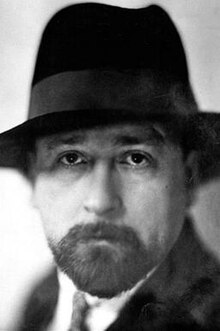Albert Londres
| Albert Londres | |
|---|---|

Albert Londres, approximately 1928
|
|
| Born | 1 November 1884 |
| Died | 16 May 1932 (aged 47) |
| Nationality | French |
| Occupation | Journalist and writer |
| Known for | One of the inventors of investigative journalism |
Albert Londres (1 November 1884 – 16 May 1932) was a French journalist and writer. One of the inventors of investigative journalism, Londres not only reported news but created it, and reported it from a personal perspective. He criticized abuses of colonialism such as forced labour. Albert Londres gave his name to a journalism prize, the Prix Albert-Londres, for Francophone journalists.
Londres was born in Vichy in 1884. After finishing secondary school, he went to Lyon in 1901 to work as a bookkeeper, then moved to Paris in 1903. He wrote occasional articles for newspapers from his native region, and published his first poetry in 1904. The same year, he started as correspondent in Paris for the Lyon newspaper Le Salut Public. Also in 1904, his daughter Florise was born, but his partner, Marcelle (Marie) Laforest, died one year later. In 1906 he became parliamentary correspondent for Le Matin. His job was to listen to gossip in corridors of the French parliament and report it in anonymous columns. When World War I broke out in 1914, Londres, unfit for military service due to ill health and a weak constitution, became military correspondent for the newspaper at the Ministry of War. Subsequently, made war correspondent, he was sent to Reims during its bombing, alongside the photographer Moreau. Londres' first big article told of the fire in the cathedral on 19 September 1914; the report was published two days later.
Londres wanted to go to the Orient; the editors of Matin refused. So he left to become a foreign affairs reporter for Le Petit Journal. In 1915 he went to south-east Europe to report on combat in Serbia, Greece, Turkey and Albania. On his return, he covered the end of the war in France. In 1919 he was sacked by Le Petit Journal under the orders of the French Prime Minister Clemenceau. Continuing his vocation, Londres reported that "the Italians are very unhappy with the peace conditions concocted by Clemenceau, Lloyd George and Wilson." He then worked for the illustrated daily Excelsior which had sought him. In 1920, Londres succeeded in entering the USSR, described the nascent Bolshevik regime, profiled Vladimir Lenin and Leon Trotsky and told of the suffering of the Russian people.
...
Wikipedia
